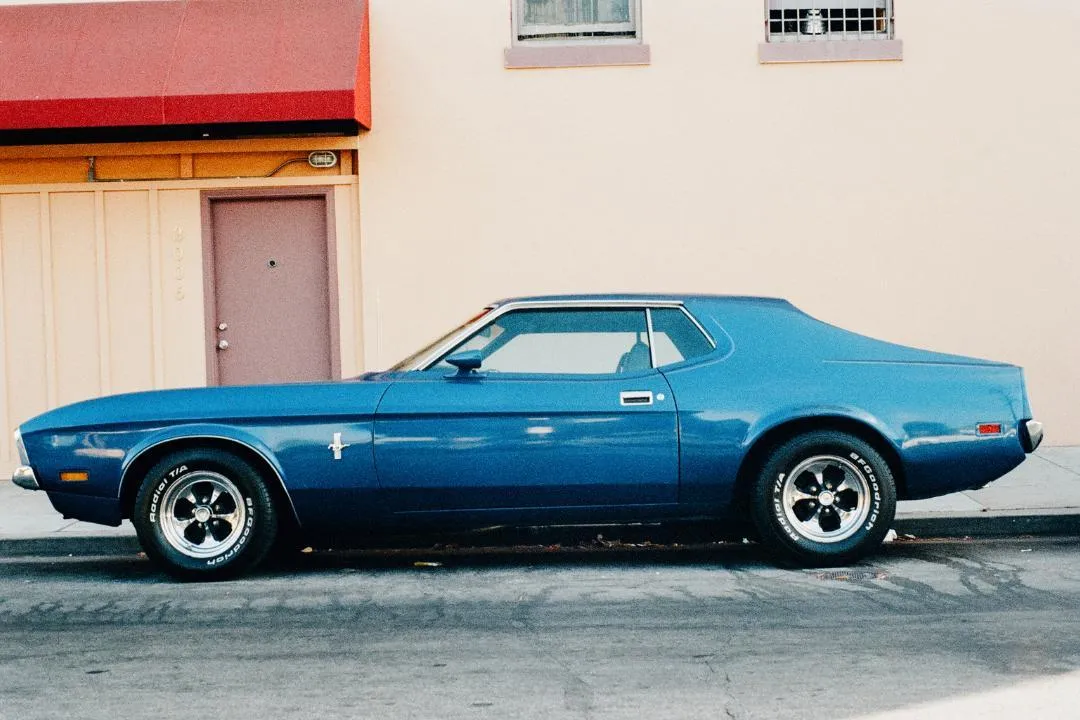Get your vehicle registered, fast.
How to Make a Classic Car Street Legal in Florida

Driving a restored 1965 Ford Mustang down Florida’s sunny highways feels like stepping back in time. Classic car owners cherish their vehicles for their history and style. Yet, registering these cars to drive legally in Florida can seem complex.
The process involves specific rules, paperwork, and costs like taxes. Many owners face challenges with documentation or state regulations. This guide simplifies the steps to make your classic car street legal in Florida. It covers eligibility, safety standards, and ways to save money.
By following this advice, you can avoid common pitfalls and enjoy your vintage ride legally.
Key Takeaways
How Florida defines classic and antique cars for registration.
Steps to verify your car’s eligibility and gather documents.
Safety and modification rules to ensure roadworthiness.
Strategies for efficient registration and special plates.
How to navigate Florida’s DMV process smoothly.
What Makes a Motorcycle Street Legal in the U.S.?
A street-legal motorcycle meets both federal and state regulations for safe operation on public roads. The U.S. Department of Transportation (DOT) sets nationwide minimum safety standards, but individual states add their own requirements. To ride legally, you must have a valid title, current registration, and a visible license plate.
Operating without a license plate is illegal in all states, leading to fines or possible impoundment. Your motorcycle must also carry liability insurance that meets state minimums and feature DOT-compliant safety equipment. According to a 2023 Motorcycle Industry Council report, properly equipped motorcycles reduce crash risk by 15%.
Federal and State Standards
Federal law ensures a baseline for motorcycle safety, while states tailor specific rules for registration, inspections, and operation. Street bikes, built for road use, differ from off-road motorcycles like dirt bikes, which typically lack DOT-approved lighting and mirrors. A bike without compliant equipment or a valid title is not street legal.
Quads and side-by-sides rarely qualify for street use, though certain states allow them after modifications like adding turn signals and mirrors. Minibikes can be converted to meet DOT standards, with costs ranging from $500 to $1,500 depending on the model and state requirements.
Converting Off-Road Bikes
Converting an off-road motorcycle for street use requires DOT-approved headlights, taillights, mirrors, tires, and a horn. You’ll also need to secure a street-legal title and pass VIN or safety inspections where required. Depending on modifications, the process can cost up to $2,000.
Some states allow small-engine bikes—such as 50cc scooters—to be operated without a motorcycle license, while others permit up to 150cc. License plate size is also regulated, with most states requiring plates at least 4x7 inches for visibility at night.
Required Equipment for Street-Legal Motorcycles
Federal DOT regulations require certain equipment to ensure safety and compliance:
- Headlight: White, visible from at least 500 feet at night.
- Taillight/Brake Light: Red, illuminates during braking.
- Turn Signals: Amber, mandatory in states like California and New York.
- Mirrors: At least one; some states require two.
- Tires: DOT-approved with proper tread depth.
- Horn: Audible from at least 200 feet.
- Muffler: Meets state-specific noise limits (typically 80–90 dB).
Always review your state’s motorcycle equipment checklist to ensure compliance and avoid penalties.
Street Legal Motorcycle Checklist:
- Valid title and registration
- Visible, state-compliant license plate
- DOT-approved safety equipment
- Liability insurance meeting state minimums
- VIN and/or safety inspection (if required)
Following these steps ensures your motorcycle is safe, compliant, and ready for the road in any U.S. state.
FAQs on Street-Legal Motorcycles in the U.S.
What makes a motorcycle street legal?
A motorcycle is street legal if it has a valid title, registration, license plate, DOT-compliant equipment, and liability insurance. It must also pass any required state safety or VIN inspections.
Can I convert my dirt bike to street legal?
Yes. You’ll need to install DOT-approved lighting, mirrors, tires, a horn, and a compliant muffler, along with securing a street-legal title and passing inspections where required.
Do all states require turn signals?
Not all states require turn signals, but they are mandatory in places like California and New York. Even where optional, they improve safety and are recommended.
What insurance is required?
Every state mandates liability insurance, with minimums varying by location. Check your state’s DMV for exact coverage requirements.
Are quads or minibikes street legal?
Generally no, unless modified extensively to meet DOT and state safety standards. Some states allow them after inspection and registration.
Conclusion
Understanding what makes a motorcycle street legal in the U.S. is key to riding safely and avoiding penalties. Federal DOT rules set the baseline, while state laws refine the details. Ensuring your bike has the right equipment, documentation, and insurance keeps it road-ready.
If converting an off-road model, plan for the necessary upgrades and inspections. Following your state’s motorcycle requirements will keep you compliant and confident every time you ride.
The street legal motorcycle checklist ensures you cover all requirements. For a complete guide on making your bike compliant in every state, check our State-by-State Motorcycle Street Legal Registration Guide to confirm your motorcycle meets local standards.

Florida’s Unique Regulations and Benefits
Florida offers benefits for classic car owners through specific rules. Vehicles over 30 years old used for shows, parades, or limited driving qualify for antique plates. These plates provide permanent registration, meaning no annual renewals. A 1972 Plymouth Barracuda owner in Miami uses antique plates for car shows, saving on fees.
The cost for Florida antique vehicle plates is lower than standard plates, often $50 or less. Classic cars skip emissions tests, unlike modern vehicles. This saves time and money. However, classic car insurance Florida is required for all registered cars, including antiques. Specialty insurers like Grundy offer affordable policies for limited-use vehicles.
Antique vehicles may qualify for tax exemptions on property taxes if driven rarely. Sales tax still applies unless you use a Montana LLC. Modified vehicle rules affect cars with significant changes, like custom engines or suspensions. These may need safety inspections to confirm roadworthiness.
For example, a 1960 Ford Falcon with a modified exhaust passed inspection after adjustments. Cars built from scratch, like kit cars, face similar checks to ensure they meet street legal requirements. Non-compliant changes, such as unsafe lights or extreme modifications, can block street-legal status. Florida’s rules balance benefits with safety, making it a great state for classic car owners.
Addressing Registration Challenges
Classic car registration can have hurdles. Missing titles are common with older cars, like a 1962 Pontiac GTO with incomplete records. You can recover a title using VIN records and a bill of sale. One owner in Tampa retrieved their title in 10 days through a service. High taxes are another issue. Florida’s sales tax can add thousands to costs. A Montana LLC with flat fee registration, as seen with a $60,000 1957 Chevy Bel Air owner who saved $4,200. FLHSMV forms, like Form HSMV 82040, can be complex. They require precise details about your car and ownership.
Safety inspections apply to modified or custom-built cars. Non-compliant features, like unapproved tires or missing lights, can prevent street-legal status. A 1968 Mustang owner in Naples adjusted their aftermarket brakes to pass inspection. Online platforms simplify paperwork and reduce errors. They guide you through each step, saving time. Street Legal Hookup’s expertise helps you handle these challenges. You can focus on enjoying your classic car instead of stressing over DMV rules. This support streamlines the process and ensures success.
Why Choose Street Legal Hookup for UTV Registration?
With flat fee registration, the process is simple and hassle-free, often $5,000 to $15,000 compared to high-tax regions. Key benefits include:
- Flat Fee Registration: A predictable, all-in-one fee covering registration, paperwork, and plate delivery.
- No Emissions or Inspections: Skip smog checks and safety inspections for a streamlined process.
- Permanent Plates: Get one-time permanent plates for eligible vehicles, no annual renewals.
- No Residency Required: Register legally through an LLC, no matter where you live.
FAQs on Classic Car Registration in Florida
What are the requirements for a classic car in Florida?
A classic car in Florida must be at least 30 years old, maintained in near-original condition, and used primarily for exhibitions, parades, or club activities. You’ll need a valid title, proof of insurance, VIN verification, and Form HSMV 82040. Street Legal Hookup can streamline this process for you.
How to make a car street legal in Florida?
To make your car street legal, verify its eligibility (30+ years old), gather documents (title, bill of sale, insurance), ensure it meets safety standards, and submit an application to the FLHSMV. Using Street Legal Hookup’s Montana LLC setup provides a streamlined, hassle-free registration process.
What are the benefits of antique plates in Florida?
Antique plates offer lower registration fees, permanent registration (no renewals), and a distinctive look for your classic car. They’re ideal for vehicles used sparingly, like a 1972 Plymouth Barracuda for car shows, saving you money over standard plates.
How old do cars have to be in Florida to be considered an antique?
In Florida, a car must be at least 30 years old to qualify as an antique, per Florida Statutes. This applies to vehicles like a 1990 or older model maintained in original or restored condition.
Do cars with antique plates need inspection?
No, cars with antique plates in Florida are exempt from emissions and safety inspections, provided they’re used for exhibitions or limited driving. Modified vehicles may still require safety checks to ensure compliance.
Do I need an emissions test for my classic car in Florida?
No, classic cars over 30 years old are exempt from emissions tests under Florida law, saving you time and costs. Ensure your car meets safety standards instead.
What documents are required for Florida classic car registration?
You need a valid title or bill of sale, proof of insurance, VIN verification, and Form HSMV 82040. Street Legal Hookup can assist with missing documents.
Can I use a Montana LLC to register my classic car?
Yes, a Montana LLC, as offered by Street Legal Hookup, provides a streamlined, hassle-free registration process. Consult a professional to ensure compliance.
How long does the registration process take?
Standard FLHSMV processing takes 1–2 weeks. With Street Legal Hookup, plates ship in as little as 3 days, with temporary tags available in 1 day.
Conclusion
Registering a classic car in Florida is straightforward with the right steps. Confirm your car is at least 30 years old and in near-original condition. Gather documents like a title, proof of classic car insurance Florida, and VIN verification to meet Florida DMV classic car rules. Ensure safety standards, especially for classic car modifications Florida. Submit your application through the FLHSMV or an online service.
Use classic car inspection Florida for modified vehicles if needed. A street-legal classic car guide FL, like a Montana LLC, provides a streamlined registration process. Street Legal Hookup simplifies the process, avoiding DMV headaches. Enjoy your classic car on Florida’s roads with ease. Contact Street Legal Hookup today to register your classic car quickly and efficiently.
The street legal classic car checklist ensures you cover all steps. For a full breakdown of every state’s rules, check our State-by-State Classic Car Street Legal Registration Guide to ensure your vehicle meets local requirements.

Register or Title Your Vehicle From Any State, Stress-Free
Click below, answer a few quick questions, and start your registration in minutes.
Get Road-Ready EasilyREADY TO get street legal?
Register or Title Your Vehicle From Any State, Stress-Free.
Click below, answer a few quick questions, and start your registration in minutes.

Register or Title Your Vehicle From Any State, Stress-Free. Guaranteed
Street Legal Hookup
Register Your Vehicle
LEGAL
STREETLEGALHOOKUP.COM IS A MONTANA VEHICLE REGISTRATION COMPANY, UNAFFILIATED WITH ANY GOVERNMENT AGENCY © 2026 Street Legal Hookup Inc. All rights reserved. Privacy Policy | Terms Of Service
